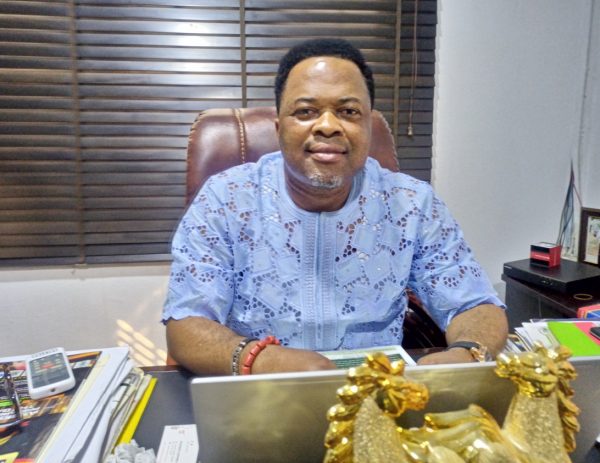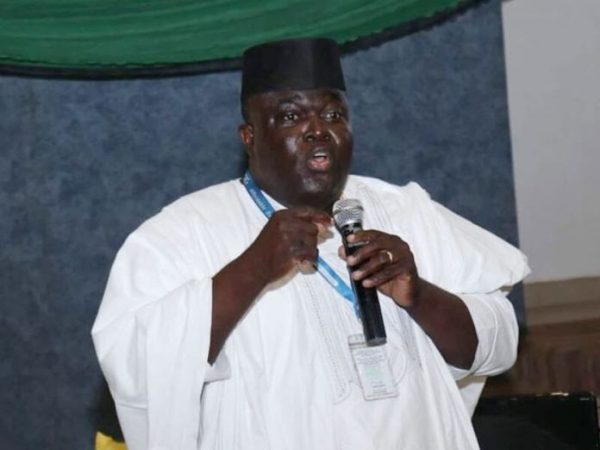CRFFN Should Prepare For Digital Elections In 2024 –Ogunojemite

In this interview with MMS Plus newspaper, Frank Ogunojemite speaks on the Council for the Regulation of Freight Forwarding in Nigeria (CRFFN) after the Governing Board elections, shares insights on better electoral systems and counsels the Transport Minister on several shortcomings at CRFFN.
Ogunojemite also harps on the causes and effects of the recent freight forwarders strike on Customs VIN valuation and other pertinent maritime issues.
Excerpts:
What’s your assessment of the recently concluded CRFFN Governing Council elections?
We are happy that the election has been concluded but we are still waiting for the inauguration date. I want to use this opportunity to draw the attention of the Minister of Transportation that now the elections have been concluded, it is time for the management of CRFFN to be sanitized and be assessed. They should change the way of doing things at CRFFN because it won’t help the Governing Council if it continues to be business as usual at CRFFN. There is a need to look into the activities at the Council holistically especially at the managerial level.
Are you satisfied with the way the election was organized?
The register of voters ought to have been pasted earlier. There were issues about that but all the same we have started with this process and we don’t expect perfection.
Two years isn’t far away and that’s why we want the Minister to fill the gap which the absence of the Governing Council created in the performance of the CRFFN. I don’t think there is anything wrong if we start thinking of automated elections at CRFFN. If there’s an automated election, you can be in your office and cast your vote. The voters’ register will be there and with your RFF number, it cannot be cloned. It will be easier for people to participate and reduce costs. The money bags around will not hijack it because the people will have options.
Not everyone was able to be present on election day. People were even scared of the security of the environment. These are issues the Minister and the Council’s management should take into cognizance in the next election.
You championed the fight for independent candidacy at the last election as against the 6-6-1-1-1 agreed by other associations.
Well, we have to commend the Transportation Minister for keeping his word not to be intimated in any way. To be honest, even if NAGAFF or ANLCA took the whole slots, I would still be happy with the fact that individual candidates were given the privilege to participate. We need to understand that corporate entities and associations are not human beings. If you go by associations, it is still human beings that constitute the association. Why don’t you go straight to see the faces of the individuals that will come onboard rather than some people in the industry dictating? Of course, NAGAFF and ANLCA have taken the slots but you never made mention of some other associations who are supposed to have been allocated some slots and were not able to make it. Anyways, this is due to the actions and strength of the associations. I’m optimistic that the next election will be quite different from this.
There are insinuations that the Minister of Transport already has his preferred candidate to become the Chairman of the Governing Board. What do you make of this?
The election always takes place before they choose the Chairman. I don’t see this Ministerial appointment happening. We should wait for that kind of thing to happen and if it happens, there’s a way for people to raise concerns about such issues. If stakeholders raise concerns, at the end of the day, the Minister will have a rethink and realize that he has taken a wrong decision by dictating or selecting the person to lead the Governing Council.
Let’s not forget what happened in the last election when someone voted himself in but this time around it was a different ball game altogether. Today, everyone has to build his or her profile and prepare for elections. Consequently, you’ll also have to lobby and convince board members to vote you as Chairman. We would continue to strive to get it right and always seek to do better.
What is the latest with regards APFFLON’s bid to get accreditation from CRFFN?
You have used the appropriate word. People always say registered association and I wonder how an association can operate without being registered. This is because the Nigerian Constitution provides registration with the Corporate Affairs Commission (CAC) which I think supersedes every other registration. Talking of accreditation, APFFLON has sent in application letters to CRFFN for over four years and there hasn’t been any response so far. However, this is of no importance to the performance and advocacy of APFFLON, especially on ease of doing business and transparency at the ports. If we have a commission or external body to come and assess associations’ performance, I think they would be able to give APFFLON a commendable review.
Look at the issue of FIATA, the Council has been parading itself as a FIATA member when it’s not yet even part of FIATA. It has been a shame among the committee of maritime nations. CRFFN was delisted because it didn’t pay annual dues. That is why I said the CRFFN management itself has to be sanitized before one can expect a positive and credible performance from the Governing Council members. Charity begins at home. Leadership is by example. Let them showcase discipline and transparency. Then we will be able to know which area to address.
Freight forwarders have been agitating and calling for the automation of the maritime industry. But in the last three months, it looks as if the freight forwarders are not ready for automation as they kick against VIN, VREG, and e-valuation. Are Nigerian freight forwarders not ready for automation?
I will say that is a misconception. Freight forwarders are not kicking against VIN. But if you need to look at the VIN platform or e-invoicing from a legal perspective, it is illegal.
Federal government through Nigerian Shippers’ Council (NSC) and Nigerian Ports Authority (NPA) was really struggling to get some rent waivers for some importers because most shipping companies and terminals didn’t adhere to government instructions. Due to the last protest, people are still paying rent as high as N160,000 to M200,000 for a car in 2008 or 2007. Where does that rent go? So, while we were protesting, the shipping companies and terminal operators were just waiting to take advantage of the situation. So, there must be a condition or clause in the concession agreements to ensure terminals comply with government directives. Government policies are very important in maintaining order, balance and fairness in the nation’s port sector.
We learnt that for the period during the protests, PTML gave 70 percent waivers and some other terminals also gave waivers. How many terminals actually gave waivers?
From the statistics I got from my members, it was only five days that was waived and if surely any terminal has done more than that, they can show us the proof. To be honest with you, I also experienced it and I still have over 20 to 22 vehicles down there which I’m trying to work on. If peradventure they have waived 70 percent, who is going to be lamenting on it? This is not supposed to be difficult because the economic regulator, Shippers Council ought to have handled this in collaboration with CRFFN.
Everyone should be able to easily get data on events in the maritime industry through these people but what data can we confirm from them. It is only if we decide to conduct a hypothesis or take samples from our members, that we can get data from practitioners. This shouldn’t be the approach or conduct in a sector where accuracy and accountability is key and these indices help guide industry professionals and government in planning for the sector.







